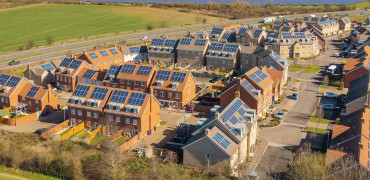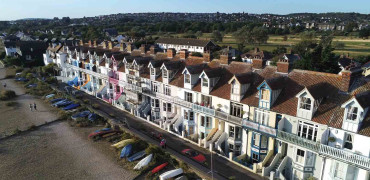Now is surely the right time to boost our heat pump installation programme
The crazy weather being experienced across the globe right now is making an incredibly strong case to all governments that we need to massively grow our commitment to green energy solutions, if we are to halt or reverse the impact of climate change on our lives.
Here at home, July is rapidly turning into a damp squib with people in Britain left wondering what on earth has happened to Summer and contemplating the rights and wrongs of turning their heating on!
This seems all the more remarkable as it followed hot on the heels of news that global temperatures in June hit a record high for the 13th straight month and it marked the 12th straight month that the world was 1.5°C (2.7F) warmer than it was in pre-industrial times, according to the European climate service Copernicus.
The weird weather disturbances are not confined to us Brits living with the vagaries of the Jet Stream.
Across the Atlantic, in North America parts of the Deep South and West are roasting in abnormally high temperatures. Records are tumbling as more than 146 million Americans were subject to extreme heat alerts with temperatures of 48.8°C (120F) recorded in Las Vegas and 54.4°C (130F) in Death Valley, California.
The new Government does appear to be far more committed than their predecessors
Hurricane Beryl
To make matters worse the Americas and Caribbean states were also being lashed by Hurricane Beryl - the earliest category five hurricane ever recorded in the region - with the US National Oceanic and Atmospheric Administration warning that the North Atlantic could get as many as seven major hurricanes this year - up from the average of three in a season.
Experts say it is difficult to attribute specific storms to climate change as the causes are complex, but exceptionally high sea surface temperatures are seen as a key reason why Hurricane Beryl has been so powerful.
In other parts of the globe, we have seen wildfires ravaging parts of northern Russia which are inside the Arctic Circle, for the third time in the past five years. More than 160 wildfires had affected nearly 460,000 hectares of land by late June.
Further south massive floods have swept through swathes of India, Nepal and Bangladesh, killing scores of people and affecting millions of others. Floods and landslides are not uncommon during South Asia's monsoon season, when it receives up to 90% of its annual rainfall, but experts say the issue has worsened in recent years due to climate change
Unusual or extreme weather is not unknown, but it certainly appears to be coming at a far more regular occurrence and scientists say that it’s human activities and human life that is having the biggest effect.
Whitehall changes
The incoming Labour Government in Britain does at least appear to be far more committed than their predecessors to introducing green energy measures, to reduce our reliance on fossil fuels and cut our carbon emissions.
Changes have already been made to the planning framework to make it easier for onshore wind farms to be built, to be followed by the setting up a new body called Great British Energy and investing in the upgrading of Britain’s homes and cutting fuel poverty through a Warm Homes Plan.
Key to the achievement of net zero targets by 2030 will be a massive increase in the installation of heat pumps into the domestic housing market for both new builds and our existing housing stock.
The Guardian newspaper has recently run a series of articles looking at the contribution to be made by electric powered heat pumps and it has concluded that newer models are both quieter and more energy efficient than their predecessors, as well as being capable of heating most homes irrespective of their age and construction type.
It further reported that better consumer information could go further in mitigating the overall impact of noise by choosing the best model for the home and using it correctly. Taken together this should remove many of the objections voiced by their critics.
In addition, the newly appointed Energy and Net zero secretary, Ed Miliband, has committed to maintaining the heat pump grants offered by the previous government to help to accelerate the rollout of the technology.
Lacking foresight and insulation
What is confusing for me is the Ostrich like approach being taken by some of the volume housebuilders, who are unwilling to take on a leadership role even where they are developing new houses which they claim to be both green and sustainable.
There is a new scheme to build over 750 homes near to where I live. Construction of the homes has yet to begin, but the developers intend to install gas boilers in every single new home, rather than installing individual air source heat pumps or connecting all of the homes to an estate-based ground source heat pump.
The developers say they will only make such a change if they are forced to do so by a change in legislation. Such a callous and obstinate approach makes me wish the new government does enact quickly and that it makes the legislation apply to all new schemes where the building of homes starts after the recent 4th of July polling day.
For existing properties, we already know that we have some of the draughtiest and least energy efficient homes in Europe. A study by the smart home company tado° monitored 80,000 users across Europe to find how quickly properties lose heat when outdoor temperatures fall to zero.
It found that British homes lost on average 3°C after five hours without heating, compared with just 1°C in Germany and 0.9°C in Norway.
This demonstrates that the provision of better insulation needs to go hand in hand with installing new heat pumps. But this work is needed regardless of the heating system being used – so it would be sensible for the Government to extend heat pump installation grants to include the cost of upgrading insulation at the same time.
Many homes would benefit from loft insulation, which is one of cheapest types of upgrades available, averaging less than £1,000 per property.
Doing this work will not necessarily bring a stop to the oddities of the British weather, but it will make us more comfortable in our homes and reduce our energy consumption, while also helping us to meet our commitments to reducing carbon emissions and reaching net zero at an early date.
Patrick Mooney is News editor, Housing Management & Maintenance




